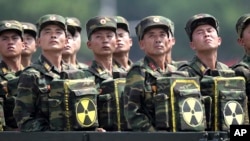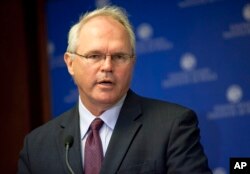A former senior diplomat under President George W. Bush says President-elect U.S. Donald Trump would quickly and unilaterally approve a preemptive military strike against North Korea to take out a standing inter-continental ballistic missile armed with a nuclear warhead.
Ambassador Christopher Hill, who led the U.S. delegation to the Six Party Talks on the North Korean nuclear issues a decade ago, said, “North Korea needs to understand that there will be a new sheriff in town in Washington.”
Hill, who currently is the Dean of the Josef Korbel School of International Studies at the University of Denver, was in Seoul on Monday to address a South Korean government conference on the prospects for peace and unification on the Korean Peninsula.
By emphasizing the President-elect’s willingness to act against a perceived North Korean threat, Hill was trying to reassure friends in East Asia that the U.S. will remain committed to the region under Trump.
But Gareth Evans, a former Foreign Minister of Australia who also participated in the conference, said it is actually worrisome to think that Trump would act impulsively against an aggressive but rational adversary who understands a nuclear attack against the U.S. is suicide, and without regard for the possibility that it could trigger a wider conflict.
"Where is that going to take us, a preemptive military strike? I mean, that is premised on the assumption that if the North Koreans have a nuclear weapon and have a missile delivery capability, the United States and everyone else is at real risk. But what on Earth is ever going to encourage the North Koreans to use such a missile in that situation?" Evans asked.
North Korea has accelerated its nuclear development program this year by conducting two nuclear tests and numerous missile launches. Experts believe that within the next five years Pyongyang will develop the capability to launch a long-range inter-continental missile armed with a miniaturized nuclear warhead.
Alliances
The surprising U.S. presidential election victory of Donald Trump has raised concern and anxiety throughout Asia that the new president will radically and recklessly alter established U.S. policy on North Korea.
As a presidential candidate Trump threatened to pull troops from allies and instead allow them to acquire their own nuclear weapons, if they did not agree to pay more for the U.S. military stationed in their counties.
There are over 28,000 American troops in South Korea and close to 50,000 in Japan.
Evans said candidate Trump instilled doubt over the U.S. commitment to maintain regional security by sending competing signals that he would take strong measures to confront China on trade while also indicating he may retreat from foreign entanglements.
“No one knows which way Trump will jump on these issues, including no doubt Donald Trump himself, because he’s obviously never studied or thought through any of them,” he said.
Continuity
Hill said moderate Republican foreign policy advisers on Trump’s national security transition team, like Mike Rogers, former Michigan congressmen and chairmen of the House Intelligence Committee, are prioritizing stability and continuity on North Korea policy in the incoming administration.
In the final presidential debate in October, Trump denied he voiced support for allowing allies to acquire nuclear weapons, contradicting statements he made earlier in the year.
After the election, the President-elect pledged his commitment to defending the region during phone calls with South Korean President Park Geun-hye and Japanese Prime Minister Shinzo Abe.
His post-election actions reflect a growing appreciation for the U.S. military presence in Asia and the importance of strong alliances with Japan and South Korea, said Hill, to counter both the North Korean threat but also the growing military power of China.
“I have no doubt that the U.S. administration, the Trump administration, we’ll be able to continue what is really one of our best relationships in the world,” he said.
Hill also voiced his opposition to the U.S. offering unconditional talks, concessions or engagement with North Korea until the Kim Jong Un leadership agrees to live up to its past promises to halt its nuclear program.
However, he concedes that under President-elect Trump, relations with China could suffer over trade and maintaining international cooperation on North Korean sanctions could become more difficult.
Youmi Kim in Seoul contributed to this report.















